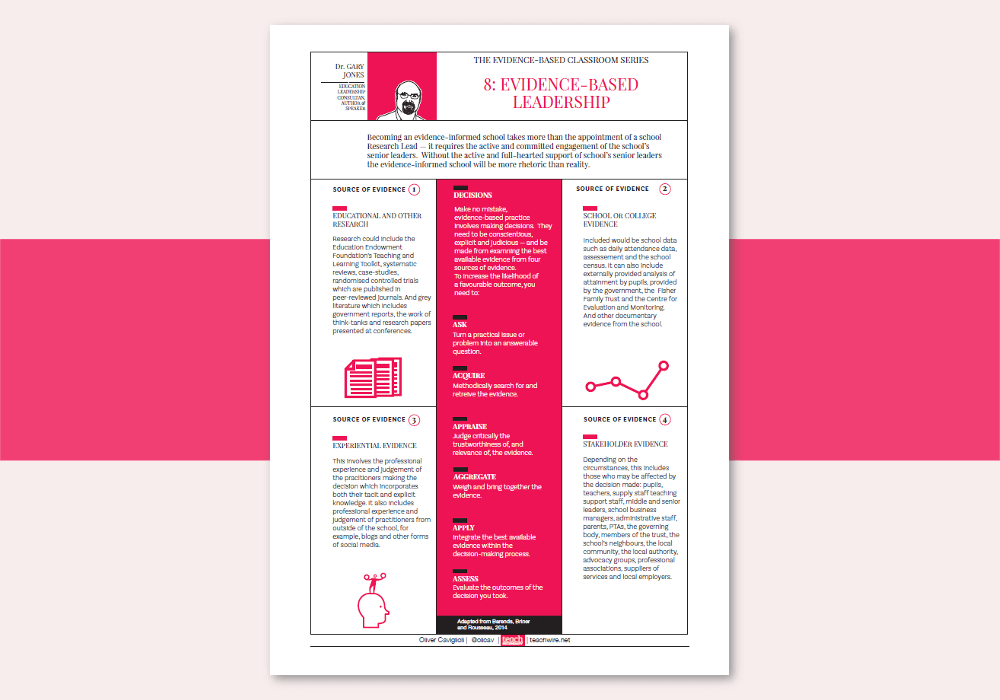KS1, KS2, KS3, KS4
Years 1-11
Becoming an evidence-informed school takes more than the appointment of a school research lead. It requires active and committed evidence-based leadership from a school’s SLT.
Without the active and full-hearted support of a school’s senior leaders, an evidence-informed school will be more rhetoric than reality.
Evidence-based leadership poster
In this evidence-based leadership poster, Dr Gary Jones runs through evidence-based ideas to incorporate into your school, including:
- Educational research
- School or college evidence
- Experiential evidence
- Stakeholder evidence
The poster also covers how to make decisions after examining the evidence. This involves:
- Turning a practical issue or problem into an answerable question
- Methodically searching for and retrieving evidence
- Judging critically the trustworthiness/relevance of the evidence
- Weighing and bringing together the evidence
- Integrating the best available evidence within the decision-making process
- Evaluating the outcomes of the decision you took
Why is evidence-based leadership so important?
For me, evidence-based leadership in schools is a moral duty. Without it, there is a danger that schools will either introduce, or continue to use, programmes/interventions that don’t work.
On the other hand, there is the risk that interventions that do work are mistakenly withdrawn from use, or never tried in the first place.
As such, using evidence is a matter of social justice. In addition, it’s very difficult for school leaders to claim they are part of a profession if they are not using the best available research evidence as part of their day-to-day work.
How well understood is evidence-based practice?
There are many, many misconceptions associated with it. For example, there is a view that evidence-based practice ignores the practitioner’s professional experience.
However, this misconception directly contradicts well-established definitions which emphasise the role of practitioner expertise.
Another misconception is that evidence-based practice is the same as research-based practice.
Again, this is clearly not the case, as the former involves drawing upon evidence from a range of sources – scientific research, stakeholder views, school/organisational data and practitioner experience.
What are the issues with education research?
There is a danger that teachers and school leaders are constantly looking for the ‘silver bullets’ and interventions/strategies that will solve their current problem.
However, making effective use of research and evidence requires much more than reading the EEF’s Teaching and Learning Toolkit and then ‘making it happen’.
Teachers and school leaders need to ask themselves questions such as:
- Does this ‘intervention’ solve a problem we have?
- Is our school similar enough in ways that matter to other schools in which the intervention appears to have worked elsewhere?
- How much improvement will we get?
- What might get in the way of the intervention so that good effects are negligible?
- How much will it cost?
How can I encourage SLT to try evidence-based leadership?
Some schools and SLTs will be more supportive of an evidence-based approach than others – so you’ll need to have a good understanding of your school and setting.
That said, I would encourage you to focus on your own practice and try to influence work done in your department.
Meanwhile, my advice to school leaders would be that if you want teachers to engage with evidence then you need to:
- provide them with the time to do it and support to help them develop capabilities in the use of research
- be willing to accept that you may need to change your mind, as research and evidence-use may lead to some uncomfortable conclusions, which challenge long-standing ways of doing things
- recognise that research and evidence-use is not a quick fix
Is it possible to remove personal prejudice from decision-making?
The decisions made by school leaders will invariably be informed by their personal and professional values, and that is a good thing.
I think what we can do is try and help school leaders think about their own thinking and help them become aware of their cognitive biases.
Evidence-based practice won’t eliminate those biases, but its use can help school leaders engage in a deeper examination of claims and underpinning assumptions. It will hopefully lead to more disciplined decision-making.
Dr Gary Jones is a blogger, author, consultant and author of Evidence Based Practice : A Handbook for Teachers and School Leaders. Follow him on Twitter at @DrGaryJones.
Oliver Caviglioli is a former special school headteacher, who is now an information designer. You can find him at olicav.com and follow him on Twitter at @olicav.













